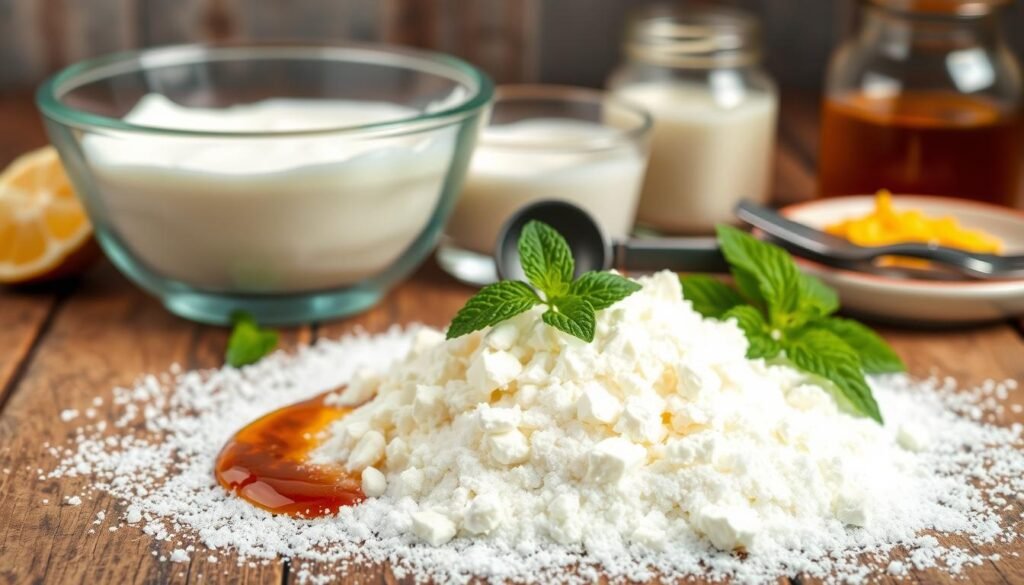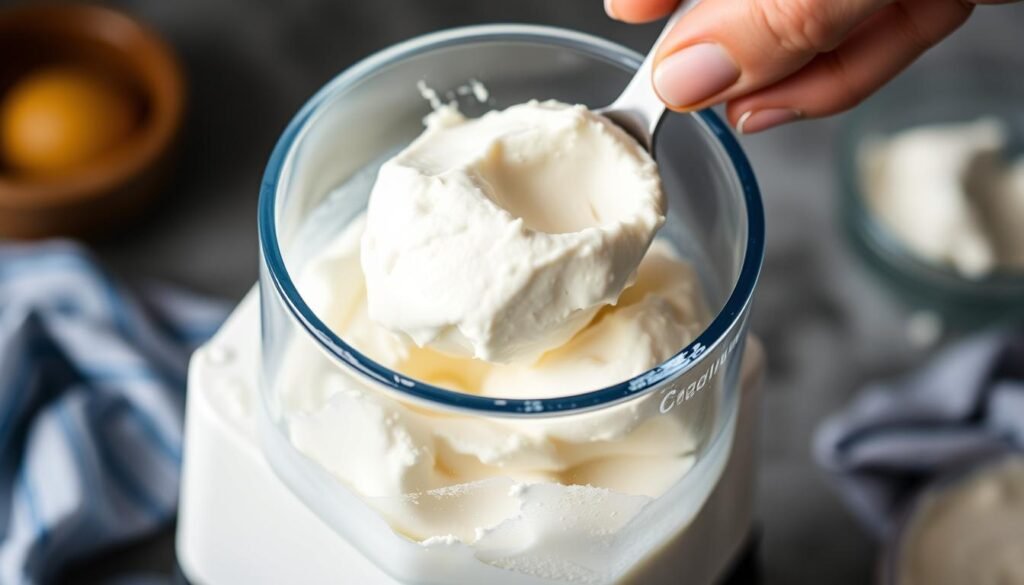You can enjoy a guilt-free dessert with cottage cheese ice cream, a protein-rich treat that’s surprisingly simple to prepare in your own kitchen.
You’ve probably seen it trending on social media – a creamy, dreamy dessert that’s not only delicious but also packed with protein. Cottage cheese ice cream has taken the internet by storm, and for good reason.
This innovative treat combines the nutritional benefits of cottage cheese with the indulgence of ice cream, creating a guilt-free dessert that’s hard to resist.
As you explore this viral sensation, you’ll discover how easy it is to make this high-protein dessert at home. With its creamy texture and rich flavor, cottage cheese ice cream is sure to become a new favorite.
Key Takeaways
- Discover the nutritional benefits of cottage cheese ice cream
- Learn how to make this high-protein dessert at home
- Explore various flavor combinations and serving suggestions
- Understand the health benefits of choosing cottage cheese ice cream
- Master the art of creating the perfect creamy texture
The Protein-Packed Dessert Revolution
You’re witnessing a revolution in the world of desserts with protein-packed treats. Cottage cheese ice cream stands at the forefront of this movement, offering a nutritious alternative to traditional ice cream.
This protein-dense dessert provides approximately 20-22 grams of protein per serving, a significant increase from the 2-3 grams found in conventional ice cream. The high protein content helps balance blood sugar levels, preventing the typical sugar crash associated with traditional frozen treats.
- Cottage cheese ice cream creates a satisfying fullness that prevents overindulgence.
- It’s suitable for post-workout recovery, supporting muscle repair.
- Unlike many « diet » desserts, this protein ice cream is delicious and sustainable.
As health-conscious consumers seek treats that offer nutritional benefits alongside indulgence, cottage cheese ice cream is poised to continue its rise in popularity. With its unique blend of taste and nutrition, it’s becoming a staple in the dessert revolution.
| Nutritional Comparison | Cottage Cheese Ice Cream | Traditional Ice Cream |
|---|---|---|
| Protein per Serving | 20-22 grams | 2-3 grams |
| Sugar Crash | Minimal | Significant |
Why Cottage Cheese Makes Amazing Ice Cream
The surprising truth is that cottage cheese makes an incredible base for ice cream. When blended smooth and sweetened, it provides a rich flavor profile similar to cheesecake. You might be amazed at how the high protein content in cottage cheese creates a uniquely satisfying texture when frozen, preventing the formation of large ice crystals.
The mild, slightly tangy flavor of cottage cheese serves as an excellent base that’s reminiscent of cheesecake when sweetened properly. When blended thoroughly, cottage cheese transforms into a smooth, creamy consistency perfect for frozen desserts. Its natural fat content contributes to a rich mouthfeel, especially when using full-fat varieties.
Cottage cheese’s versatility allows it to pair beautifully with various sweeteners and flavorings, from honey and maple syrup to fruit and chocolate. Unlike plant-based milk alternatives, cottage cheese provides a dairy-rich flavor without requiring additional thickeners or stabilizers, making it an ideal ingredient for ice cream.
Health Benefits of Cottage Cheese Ice Cream
Cottage cheese ice cream offers numerous health benefits, making it a smart choice for dessert lovers. This healthier ice cream alternative contains more fiber and less sugar than traditional ice cream while providing significant protein content that helps with satiety.
One of the key advantages of cottage cheese ice cream is its high-quality protein content. You’re getting substantial nutritional benefits, including complete protein containing all essential amino acids. The calcium content in cottage cheese ice cream supports bone health, providing approximately 10-15% of your daily calcium needs per serving.
Nutritional Comparison
| Nutrient | Cottage Cheese Ice Cream | Traditional Ice Cream |
|---|---|---|
| Protein | High | Low |
| Sugar | Lower | Higher |
| Fat | Adjustable | High |
| Sodium | Can be low (with no-salt-added cottage cheese) | Varies |
You’ll consume fewer calories and less sugar compared to traditional ice cream, making this a smarter choice for regular indulgence. The higher protein content increases satiety, helping you feel satisfied with a smaller portion and potentially supporting weight management goals. You can easily adjust the fat content by choosing different varieties of cottage cheese, from full-fat for maximum creaminess to low-fat for reduced calories.
For those monitoring sodium intake, look for no-salt-added cottage cheese varieties to create a lower-sodium frozen dessert. By making informed choices about the type of cottage cheese used, you can tailor your cottage cheese ice cream to meet your dietary needs and preferences.
Essential Ingredients for Basic Cottage Cheese Ice Cream
The base recipe for cottage cheese ice cream requires only three essential ingredients: cottage cheese, a liquid sweetener like honey or maple syrup, and vanilla extract for flavor depth.
For the best results, choose a high-quality, full-fat cottage cheese that is free from additives. You can customize your sweetener based on dietary preferences, using options like honey, maple syrup, or sugar-free alternatives.
- Use full-fat cottage cheese for a creamier texture.
- Customize your sweetener with honey, maple syrup, or sugar-free options.
- Add a fat source like peanut butter to enhance flavor and texture.

Equipment You’ll Need

Making cottage cheese ice cream requires a few key pieces of equipment. A high-powered blender or food processor is necessary to break down the cottage cheese curds and create a smooth base.
You’ll also need a freezer-safe container with a tight-fitting lid. Options include loaf pans, ice cream containers, or even the original cottage cheese container.
An ice cream scoop with a release mechanism makes serving easier, especially when the ice cream is fully frozen. A silicone spatula can be helpful for transferring the mixture and incorporating mix-ins.
No ice cream maker is required, making this recipe accessible. For an even creamier texture, consider using a Ninja Creami or similar specialized frozen dessert maker.
Step-by-Step Recipe for Cottage Cheese Ice Cream
The process of making cottage cheese ice cream is simple and rewarding, requiring minimal ingredients and effort. You start by blending the main ingredients together to create a smooth base.
Blending Tips for Ultra-Smooth Texture
To achieve an ultra-smooth texture, it’s essential to blend the cottage cheese, sweetener, and flavorings thoroughly. Blend in intervals of 30-60 seconds, scraping down the sides between blends to ensure all curds are processed. This step is crucial for a creamy final product.
Freezing Methods and Timing
After blending, pour the mixture into a freezer-safe container and cover it with plastic wrap to prevent ice crystals from forming. Freeze for at least 3-4 hours, stirring every hour during the first 2-3 hours for optimal texture. For the best results, consider freezing overnight.
| Freezing Time | Texture Outcome |
|---|---|
| 3-4 hours | Solid, scoopable |
| Overnight | Creamy, set |
Before serving, let the ice cream thaw for 5-10 minutes at room temperature. You can also add mix-ins like chocolate chips or peanut butter for varied flavors.
8 Delicious Flavor Variations
Cottage cheese ice cream serves as a fantastic canvas for a wide range of flavor creations. You can easily customize it to suit your taste preferences, making it a versatile dessert option.

Fruity Flavor Options
For a refreshing twist, you can blend in your favorite fruits to create unique flavors. Adding 1 cup of frozen strawberries, blueberries, or mango directly into the base recipe works well. Alternatively, you can create a fruit swirl by adding jam after blending, giving your cottage cheese ice cream a fruity and vibrant taste.
Decadent Dessert-Inspired Variations
If you’re looking for something richer, consider adding cookie pieces, brownie chunks, or crushed candy to your ice cream. Swirling in 2-3 tablespoons of peanut butter, almond butter, or cashew butter can also add a decadent flavor. For a strawberry cheesecake flavor, incorporate fresh strawberries and crushed graham crackers into your cottage cheese ice cream base.
Serving Suggestions and Toppings
The possibilities are endless when it comes to serving cottage cheese ice cream. You can serve it in a bowl, cone, or as part of a sundae with various toppings, just like traditional ice cream.
Fresh fruit toppings such as sliced strawberries, blueberries, or banana complement the creamy texture and add nutritional value. For added crunch, try using granola, toasted nuts, or cacao nibs. To elevate your dessert, drizzle with warm peanut butter or chocolate sauce just before serving.
You can also create an ice cream sandwich by layering the ice cream between cookies or waffles for a protein-enhanced treat. Alternatively, layer the slightly softened cottage cheese ice cream with Greek yogurt and fruit for a parfait-style presentation that’s perfect for breakfast or dessert.
Storage and Thawing Tips
Proper storage is key to maintaining the creamy cottage cheese ice cream texture. To keep it fresh, store it in an airtight container in the freezer for up to 2-3 weeks.
Before sealing the container, cover the ice cream with plastic wrap to prevent ice crystals from forming. When you’re ready to serve, allow the ice cream to thaw at room temperature for 5-10 minutes to achieve optimal scooping consistency.
- Use an airtight container to prevent freezer burn.
- Portion into single-serving containers for convenience.
- Run your scoop under warm water between servings for easier scooping.
The high protein and fat content in cottage cheese ice cream helps maintain its texture during storage. Avoid repeated thawing and refreezing to keep it smooth.
Troubleshooting Common Issues
Troubleshooting is key to perfecting your cottage cheese ice cream recipe. When making this protein-packed dessert, you might encounter a few common issues that can be easily resolved.
One common problem is an icy texture. This can occur if you’re using low-fat cottage cheese. To fix this, try switching to full-fat varieties or adding more fat through ingredients like cream or nut butter.
- If your ice cream is too hard, allow it to thaw for 10-15 minutes before serving. You can also incorporate more fat or alcohol-based extracts to lower the freezing point.
- A grainy texture usually results from insufficient blending. Ensure you process the cottage cheese until it’s completely smooth, which may take 2-3 minutes in a high-powered blender.
- If your protein ice cream melts too quickly, check your freezer temperature or increase the solid content in your recipe.
Other issues you might encounter include flavor problems, which can be resolved by adjusting sweetener levels or adding a pinch of salt. If you notice a strange aftertaste, try switching to a different cottage cheese brand. For mix-ins that sink to the bottom, add them after partially freezing the base for about 30-60 minutes.
By addressing these common issues, you can perfect your cottage cheese ice cream recipe and enjoy a delicious, protein-rich dessert.
Nutritional Information and Dietary Considerations
Understanding the nutritional content of cottage cheese ice cream is crucial for making informed dietary choices. A typical serving contains approximately 150-280 calories, 12-22g protein, 7-12g fat, and 15-35g carbohydrates, depending on the ingredients used.
| Nutritional Component | Amount per Serving |
|---|---|
| Calories | 150-280 |
| Protein | 12-22g |
| Fat | 7-12g |
| Carbohydrates | 15-35g |
| Sodium | 300-500mg |
You can adapt this recipe for various dietary needs. For instance, using lactose-free cottage cheese can help those with lactose intolerance, while plant-based alternatives can make it dairy-free. The sodium content varies by cottage cheese brand, so choosing low-sodium options is advisable if that’s a concern.
The recipe can be tailored to specific dietary protocols like keto by using full-fat cottage cheese with sugar-free sweeteners, creating a low-carb frozen dessert. Additionally, this protein ice cream provides approximately 10-15% of your daily calcium needs per serving, supporting bone health alongside protein intake.
Conclusion: Embrace the Cottage Cheese Ice Cream Revolution
Embracing cottage cheese ice cream means embracing a world of flavors and nutritional benefits, all while satisfying your sweet tooth. You now have the tools to create delicious, protein-rich ice cream at home with minimal ingredients. This versatile dessert allows for endless creativity through flavor variations and toppings. By making cottage cheese ice cream, you’re joining a movement of health-conscious individuals who prioritize nutrition without compromising on taste.









